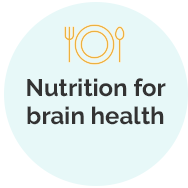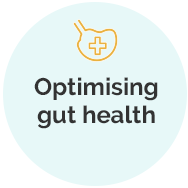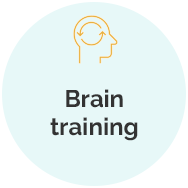 Nutrition for brain health
Nutrition for brain health
Nutrition is an essential part of The Brain Health Programme – the core elements of a diet to support brain function are:
- Low in sugar, moderate in starchy carbohydrates
- Healthy fats
- Plenty of vegetables

 Low sugar and moderate starchy carbohydrates
Low sugar and moderate starchy carbohydrates
A low glycaemic load diet is recommended to prevent the development of insulin resistance and increase insulin sensitivity – insulin resistance within the brain can have a number of detrimental effects on cognitive function.
 Plenty of vegetables
Plenty of vegetables
Vegetables contain vitamins, minerals and anti-inflammatory phytonutrients. they are also high in fibre, which is important for the gastrointestinal system.
 Healthy fats
Healthy fats
The brain is 60% fat, so adequate healthy dietary fats, including the omega-3 fatty acids EPA and DHA, are important. It is crucial that the right types of fats are consumed as bad fats contribute to inflammation within the body.
Food for thought: did you know…
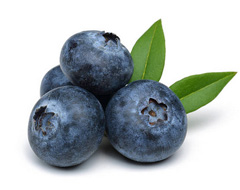
BLUEBERRIES
Eating blueberries in the morning can help keep the brain active later in the day
Research has shown that eating a bowl of blueberries at breakfast helps improve concentration and memory up to five hours later. Studies have also shown that blueberries can provide a short-term boost in the brain function of children.
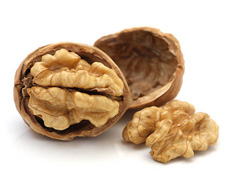
WALNUTS
Walnuts may be beneficial in slowing the progression of cognitive decline
Research has shown that walnuts may have a protective effect against oxidative stress and cellular death. It’s also interesting that walnuts look like the brain!

BEETROOT
Beetroot supports blood flow to the brain
Beetroot is high in nitric oxide, which helps open up the capillaries to allow blood flow to the brain. This in turn supports the delivery of oxygen and nutrients, which are important for brain health.

COCONUT OIL
Coconut oil appears to improve cognitive ability
Coconut oil contains medium chain triglycerides, which are unique in that they are easily absorbed and metabolised by the liver, and can be converted to ketones. Ketone bodies are an important alternative energy source in the brain, and may be beneficial to people with memory impairment.
